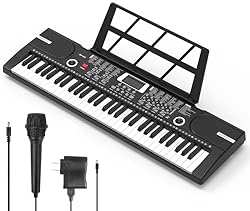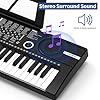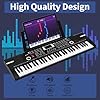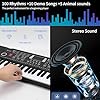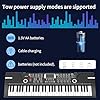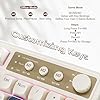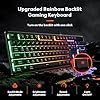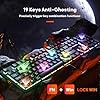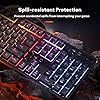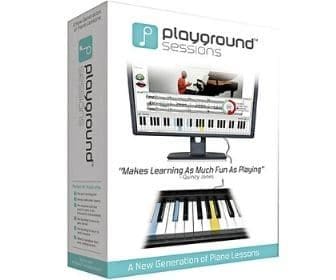Table of Contents
Introduction to Step-by-Step Guide to Learning Piano for Busy Adults
Learning to play the piano as an adult can seem like a daunting task, especially for those with a full schedule. This guide is designed to help busy adults navigate the process of becoming proficient at the piano efficiently and enjoyably. Whether you have prior musical experience or are starting from scratch, this guide will provide you with a structured and clear pathway. Explore how to make the most of your limited time while ensuring continuous progress and satisfaction in your musical journey.
Setting Realistic Practice Goals and Schedules
Balance is key when learning piano as a busy adult. Here are some strategies to help you set realistic practice goals and maintain a consistent schedule:
Yamaha Arius Series 88-Key Weighted Action Upright Digital Piano, CFX Concert Grand Piano Voice, 3-Pedal Unit, Bench Included, Classic Upright Design, Black YDP145B
17% OffFree Piano - Learn to Play Piano
$0.00 (as of November 22, 2025 22:56 GMT -08:00 - More infoProduct prices and availability are accurate as of the date/time indicated and are subject to change. Any price and availability information displayed on [relevant Amazon Site(s), as applicable] at the time of purchase will apply to the purchase of this product.)Classical Piano for Sleep and Relaxation
$9.99 (as of November 22, 2025 22:56 GMT -08:00 - More infoProduct prices and availability are accurate as of the date/time indicated and are subject to change. Any price and availability information displayed on [relevant Amazon Site(s), as applicable] at the time of purchase will apply to the purchase of this product.)61 keys keyboard piano, Electronic Digital Piano with Built-In Speaker Microphone, Sheet Stand and Power Supply, Portable piano Keyboard Gift Teaching for Beginners
$164.00 (as of November 22, 2025 23:10 GMT -08:00 - More infoProduct prices and availability are accurate as of the date/time indicated and are subject to change. Any price and availability information displayed on [relevant Amazon Site(s), as applicable] at the time of purchase will apply to the purchase of this product.)Begin by taking a close look at your weekly schedule. Identify pockets of free time where you could realistically fit in piano practice. Remember, even short daily practice sessions are more effective than long, infrequent ones. Aim for consistency over intensity.
Establish clear, achievable goals that align with your available practice time. This could be learning a particular piece, mastering a technical skill, or even just committing to playing for a certain number of minutes each day. SMART Goals – Specific, Measurable, Achievable, Relevant, and Time-bound – are particularly effective in maintaining motivation.
Not all practice is created equal. Focus on what will give you the most significant progress. This typically includes a blend of scales, technical exercises, sight-reading, and working on repertoire. Allocate time to each area based on your goals.
Many apps and online resources can help streamline your practice sessions. Metronome apps, recording software, and online tutorials can provide structure and instant feedback, making your practice time more productive. Furthermore, scheduling apps can set practice reminders, ensuring you remain consistent.
P71 Digital Piano Review and Guide
$0.00 (as of November 22, 2025 14:40 GMT -08:00 - More infoProduct prices and availability are accurate as of the date/time indicated and are subject to change. Any price and availability information displayed on [relevant Amazon Site(s), as applicable] at the time of purchase will apply to the purchase of this product.)Wicked - A New Musical Songbook by Stephen Schwartz | Piano Vocal Selections with 13 Broadway Hits | Sheet Music for Piano Voice and Guitar | Authentic Arrangements for Performers Students and Fans
31% OffReady for Theory Level 3 Piano Review Book (Ready for Theory Piano Review Books)
$12.95 (as of November 22, 2025 14:46 GMT -08:00 - More infoProduct prices and availability are accurate as of the date/time indicated and are subject to change. Any price and availability information displayed on [relevant Amazon Site(s), as applicable] at the time of purchase will apply to the purchase of this product.)The Piano Proficiency Exam Review Book
$14.57 (as of November 22, 2025 14:43 GMT -08:00 - More infoProduct prices and availability are accurate as of the date/time indicated and are subject to change. Any price and availability information displayed on [relevant Amazon Site(s), as applicable] at the time of purchase will apply to the purchase of this product.)Your practice environment can significantly impact your effectiveness. Ensure your space is quiet, well-lit, and free from distractions. Having a dedicated practice area makes it easier to transition into practice mode, even if your time is limited.
Life can be unpredictable, especially for busy adults. While it’s important to stick to your practice schedule as much as possible, allow yourself the flexibility to adjust when necessary. If you miss a session, don’t be discouraged; simply get back on track as soon as you can.
Periodically assess your progress and adjust your goals as needed. If you find that certain targets are too ambitious, scale them back. Conversely, if you’re consistently hitting your goals, consider setting more challenging ones. Regular reflection ensures that your practice remains productive and aligned with your evolving capabilities.
Fitting Piano Practice into a Busy Lifestyle
Finding time for piano practice can be challenging with a busy schedule, but with some strategic planning and dedication, it can be done. Here are some tips to help you fit piano practice into your lifestyle:
Begin by setting realistic and achievable goals. Instead of aiming for an hour every day, start with 15-20 minutes of focused practice sessions. This approach makes the task less daunting and easier to fit into a hectic schedule.
Identify when you have pockets of free time throughout your day. It could be early morning, during lunch breaks, or in the evening. Block out these times in your calendar specifically for piano practice, treating them with the same importance as other meetings or appointments.
Focus on using efficient practice techniques such as goal-oriented practice and interleaving practice. Instead of repeating the same piece from start to finish, break it down into smaller sections and work on improving specific parts.
Utilize technology to aid your practice. Apps and online tools like metronomes, tuners, and recording applications can make your practice sessions more efficient. Additionally, using apps that provide guided lessons can help you stay on track with your learning goals.
There are various ways to practice piano even when you’re not at the instrument. Consider using a roll-up piano or a keyboard app on your mobile device for quick practice sessions during commutes or while waiting.
Incorporate pieces that you enjoy and are excited to play. This can make practice sessions feel less like a chore and something to look forward to. Building a repertoire of enjoyable pieces can motivate you to practice more frequently.
Share your practice goals with friends, family, or fellow piano learners. Joining a piano learning community or taking lessons from a teacher can provide the accountability needed to stay committed to your practice schedule.
Life can get busy, and there will be days when you might miss a practice session. Instead of being hard on yourself, acknowledge the effort you’re putting in and simply get back on track the next day. Consistency is the key, even if it’s in small doses.
By incorporating these tips, you can develop a sustainable piano practice routine that fits seamlessly into your busy lifestyle, allowing you to make steady progress while balancing other commitments.
Choosing the Right Songs to Learn First
The selection of your first songs to learn on the piano can significantly influence your learning experience and motivation. Here’s how to choose wisely:
Begin with songs that have easy and recognizable melodies. Simple songs make it easier to focus on finger positioning, rhythm, and basic techniques without becoming overwhelmed.
Playing music that resonates with you will keep you motivated. Select pieces that you find enjoyable and exciting, even if they are slightly more challenging. Personal connection to the song can enhance your practice sessions.
Ensure the songs you pick are suitable for beginners. Many beginner piano books and online resources offer simplified versions of popular songs, which are excellent choices for early practice.
Take advantage of online platforms and apps that provide structured piano lessons and curated song lists for beginners. Platforms like Simply Piano, Flowkey, and Yousician can be particularly helpful in choosing the right songs.
Experiment with a variety of musical genres to discover what you enjoy playing the most. This exploration can also broaden your skills and expose you to different playing techniques.
If you’re unsure about where to start, a piano teacher or a more experienced pianist can provide valuable recommendations tailored to your current skill level and musical interests.
Remember, the goal is to build confidence and enjoy the learning process. By wisely choosing the right songs, you make your piano learning journey more enjoyable and enriching.
Quick Practice Routines for Fast Progress
Begin each session with short finger exercises to loosen up your hands. Use scales and arpeggios starting slowly, then gradually increasing the speed. This helps to build strength and dexterity, which are essential for more complex pieces.
Choose a few common chord progressions (like I-IV-V-I) in different keys and practice transitioning between chords smoothly. This practice enhances your ability to play harmonically and prepares you for a variety of pieces. Consider using a metronome to keep a steady pace.
Spend a few minutes each session sight-reading new pieces. Start with simpler compositions and gradually introduce more complexity. This practice develops the ability to quickly understand and play unfamiliar music, an essential skill for any pianist.
Break down your chosen piece into small sections and focus on mastering one section per session. Practice each section slowly at first, paying attention to fingering and dynamics. Gradually increase the speed as you become more comfortable.
Incorporate technical exercises such as Hanon or Czerny into your routine. These exercises are specifically designed to improve finger strength, agility, and control. They might seem repetitive, but they’re highly effective in building a solid technical foundation.
End your practice session by playing through a piece you’re currently working on or an old favorite from start to finish. This helps consolidate your learning and gives you a sense of completion. It’s also a way to monitor your progress over time.
Finish your session with some free play. Improvise using the chords and scales you’ve practiced. This encourages creativity and helps you develop a personal style. It’s also a great way to relax and enjoy the instrument.
Staying Consistent with Limited Time
Maintaining consistency can be particularly challenging for busy adults, but it’s also crucial for progress. Here are key steps to help you stay consistent even when time is limited:
Break down your long-term piano goals into smaller, achievable milestones. Instead of aiming to master an entire piece, start with 5-10 measures every week. This makes the goal less daunting and more manageable.
Allocate specific time slots in your calendar for piano practice. Consistency is key, so try to practice at the same time each day. Even 15-20 minutes daily can make a significant difference.
Focus on the quality of your practice rather than the duration. Short, focused practice sessions are often more effective than longer, unfocused ones. Concentrate on techniques and pieces that challenge and help you improve.
Utilize mobile apps and online resources to guide your practice. Many apps offer structured lessons and real-time feedback, making it convenient to practice effectively, even with limited time.
Keep a practice journal to document what you’ve practiced and any progress made. Reviewing your improvements can be motivating and help you adjust your goals and practice routine as needed.
Understand that life happens, and sometimes you may miss a practice session. Don’t be hard on yourself; instead, adapt and find another time to make up for it. The key is not to quit but to keep moving forward, no matter how slowly.
Join online forums or local groups of adult piano learners. Sharing your experiences and challenges with others can provide encouragement and additional resources, helping you stay motivated and consistent.
Conclusion
Learning piano as a busy adult may seem challenging, but with the right approach, it is undoubtedly achievable. By setting realistic goals, creating a structured practice schedule, using technology and online resources, and maintaining a positive mindset, you can make significant progress on your musical journey. Remember, consistency is key, and every small step forward brings you closer to your piano playing aspirations.















